Introduction
Thispublicationprovidesacomprehensiveguide tothecurrentcurriculumatQueenElizabeth’sSchool.
Eachsubjectsyllabusiscarefullychoseninordertoprovideboys withanacademicprogrammethatisatonceintellectuallyrigorous andexciting.Thecurriculumincludestraditionalapproachesand ‘hard’subjects,whileatthesametimefullyembracinginnovation wherethatisappropriateandworthwhile.Inshort,weofferabroad andbalancedcurriculum.
ThroughitandthroughourextensiveAcademicEnrichmentprogramme, weseektonurtureaspiritoffree-thinkingscholarshipinalltheboys duringtheirtimeattheSchool.Ouraimisthatbythetimetheyleave, notonlywilltheyhaveacquiredathoroughmasteryofthecurriculum materialfortheirsubjects,butwillalsohavedevelopedhabitsof intellectualcuriosity,witheachboyhavingtakenadvantageofthe manyopportunitiesweofferbeyondtheclassroomtopursuehis ownacademicinterests.
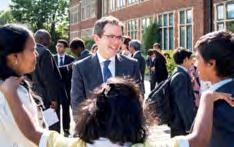
NeilEnright,Headmaster QueenElizabeth’sSchool
Foraguidetotheethosandthinkingbehindtheteachingineachacademicdepartment,see thefacultysectionsof ourwebsite’s AcademicProgrammemenu.Thismenualsoincludesan introductiontoour AcademicEnrichment programme.
ArtatQEfocuseson‘fineart’,whichmeansexpressingourselves andourresponsestotheworldaroundusforpersonalfulfilment ratherthanpracticalfunction.However,theaimisthattheskills developedcanbeappliedtoawiderangeofotheraspectsofart anddesign,andthatthesemaybetakenupinhighereducation forpracticaldegreecoursessuchasArchitecture,GraphicDesign, Film,ProductDesignorFashionandTextiles.
Essentially,weencourageanopen-endedprocessofexperimentationwith materialsandideas,yetonethatisrootedinfundamentalprinciplesaboutspace, formandstructure.Developinganappreciationofthepracticesofartistsandof movementsinartpastandpresentgoeshandinhandwithpracticalwork.Weaim todeliverprojectsthatgiveallboystheopportunitytoexperienceArtinafulfilling andmeaningfulway,irrespectiveofnaturalability.Lessonsaredesignedtoprovide asupportivestructure,whileallowingopportunityforindividualinterpretationand personaldirection.LowerSchoolprojectsdevelopconceptsthatarerevisitedand developedtoahigherlevelatGCSEandfurtheratA-level.Cross-curricularlinks areexploredateveryopportunity,sothatknowledgeandunderstandinggained inrelationtoArtcanbeappliedtoarangeofothercontexts.
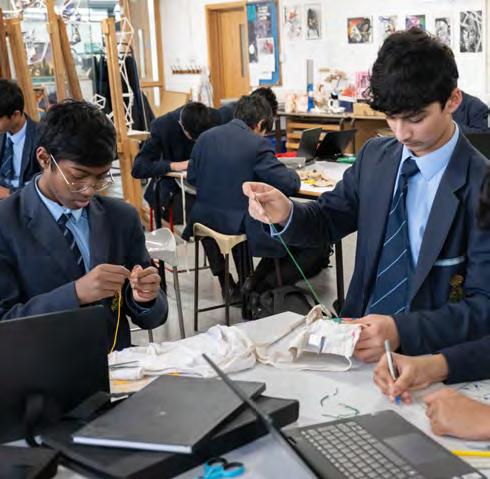
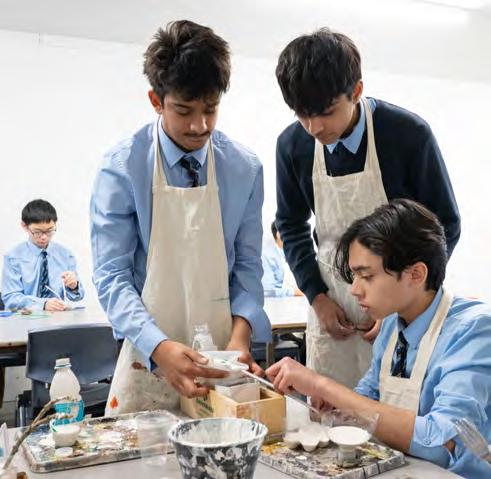
LowerSchoolArt:Years7–9(KeyStage3)
TheLowerSchoolcurriculumhereatQueenElizabeth’s isdesignedtodevelopthefollowingskills
• Academicintegrity
• Assimilationofinformation
• Analysisandsynthesis
• Concentration
• Constructingandsupportingarguments (inwritingandorally)
• Criticalthinking
• Open-mindedness
• Planning
• Problem-solvingandcreativity
• Progressiveindependence
• Reflection
• Researchandreferencing
• Resilienceandresourcefulness
• Revision
Specifically,theArtcurriculum willdevelopthesepracticalskills
• Sensitivityandcontrolusingtoolsandmaterials
• Experimentationwithmaterialsandtechniques
• Explorationideasandrecordingexperiences
• Developmentofideas
• Refiningtechniquesandmedia
• Digitalmedia
• Proficiencyinthehandlingofdifferentmaterials
• Observationaldrawing–understandingform
• Photography
• Photoshop
• Basicvisualelements–line,shape,toneandcolour
• Developingsensitivityinthewayformsarerecorded andobserved.
• Experienceofboth2Dand3Dapplication
KnowledgeandUnderstanding
• Analysisandevaluation
• Assessingthevisualimpactorapplications oftheirwork
• Recognitionandunderstandingofhowarthas meaningandcontextandisnotjust‘artforart’ssake’.
• Encouragingthedevelopmentofone’simagination andunderstandinghowthefunctionofaccessing animaginationenrichestheworldweinhabit
• Criticalandcontextualunderstanding–criticalthinking
• Culturalcontext
• Contemporaryartissuesincludingidentity
Theopportunitytosupport,encourageandpromotecreativity iswhyIbecameateacher;Iconsidermyselfveryfortunate toworkinaschoolthatvaluescreativitysohighly.Helping toequiptheboyswiththeskillsandunderstandingtorecord andinterpretthevisualworldaroundthemisbothexciting andrewarding.
MrCraigWheatley,HeadofArt
LowerSchoolArt:Years7–9(KeyStage3)
Year7
AbstractWorlds
Foundation,IntroductiontoArt
Basicexercises–exploring materials,techniques,including anintroductiontocolourtheory.
Line,shape,andpattern
Developingpatternsthatexplore determinacyandindeterminacy –focusingupontribalrugs,maps, depthofspace.
Exploringthehistoryof Modernismbylookingand respondingtoSuprematism, CubismandAbstract Expressionism.Focusingonthe workofKazimirMalevich,Paul Cézanne,PabloPicasso,Jackson Pollock,MarkRothko,FranzKline andRobertMotherwell.
Creatingcollagraphplatestoprint abstractcompositions.
Anintroductiontoceramics,with everypupilcreatinganabstract tilethatisbothbisque-firedand glazed.
Exploringpatternandcolour throughtheworkofHilmaafKlint, RanaBegumandBridgetRiley.
Exam–GraphicScoresand AbstractCompositions,linking toMusic.
Year8
DystopianEnvironment
Lookingattheworldaroundus andtheenvironmentalimpactwe arehaving.Pupilswillbe encouragedtomakedirect primaryobservationalstudies,as wellasdevelopingtheirabilityto recordfromsecondarysources. MichaelLandy,EdwardBurtynsky, AnselmKieferandJohnVirtue.
Observationaldrawingofweeds, plasticbags,brokenobjects,and landscapes.
Expandingunderstandingofthe creativeindustries–visittoWarner BrosStudio.Lessonandtourat theWarnerBrothersStudio, focussingontherangeofcreative industriesinvolvedinthemaking oftheHarryPotterfilms. Highlightedpathways–Special andVisualEffects,Costumeand Fashion,GraphicDesign, Architecture,Illustration,Set Design,Model-Making,StoryBoarding/Animation,PropDesign, ConceptArt,Cinematography.
Respondingtothevisit,pupils experimentwithwhitecard/paper setmodels,storyboardingand costumedesign.
Exam– DystopianEnvironments ConceptArt/Storyboard/Set Design.
GCSE:Years10–11(KeyStage4)
Pleasefollowthelink: AQAArt&DesignGCSE(FineArtoption)
A-level:Years12–13(KeyStage5)
Pleasefollowthelink: AQAArt&DesignAS&A-level(FineArtoption)
Year9
HumanIdentity
Whoarewe?Whatshapesour identity?Whatiscultureand civilisation?Howhashuman identitybeenvisuallyrepresented andshapedinhistory?Nan Golding,ThomasRuff,Julian Opie,BarbaraKruger,GrecoRomanesquesculpture, museumartifacts,selfies.
Graffiti/Doodle–freeassociation Urbanart,tribalart.David Shillinglaw,A.J.Purdy. Photography-TheSelfie.Traced Drawing,SquaringDrawing.
ConstructedHead–Geometric Drawing–Asymmetry–Machine Head/Man–Machine.Naum Gabo,Constructivism,Futurism, ScienceFiction,Metropolis.
MixedMediaHead–multilayered,collagesreflectingthe complexnatureofouridentities. PopArt–RichardHamilton Justwhatisitthatmakestoday’s homessodifferent,soappealing? –Updateandpersonalised Photomontage–politicalsatire, Surrealism,Dada,Raul Haussmann,HannahHoch.
Typography–printedwords–lino cut–Dada.iPadwork–Procreate –JulianOpieIconicfashion–Conversedesign.
Exam– ExpressiveHeads –linking toEnglishtext Frankenstein.
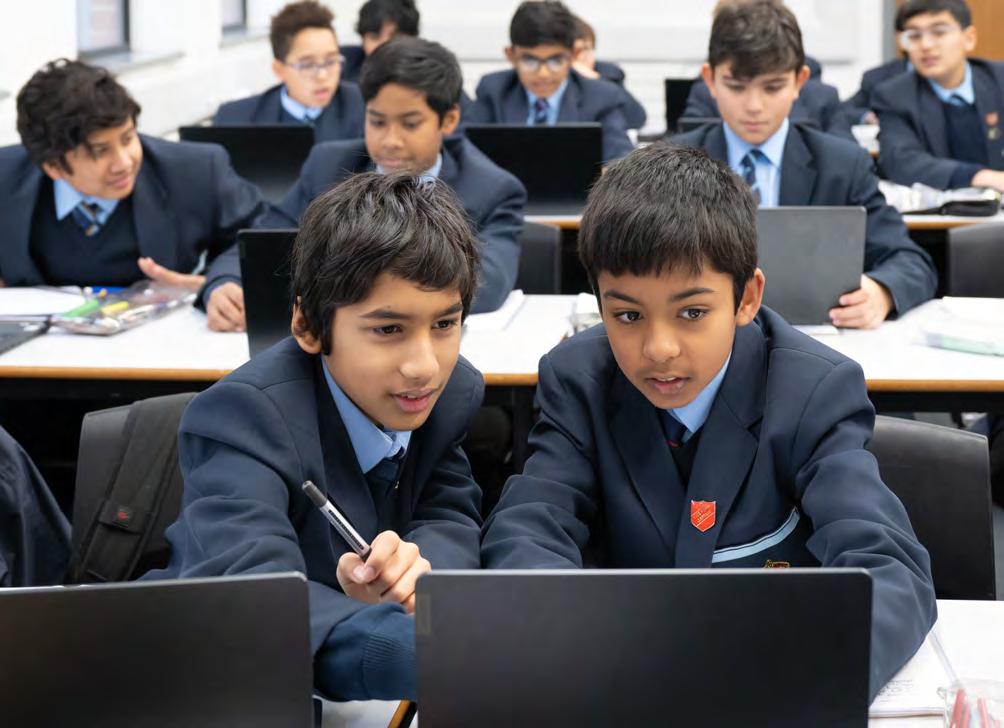
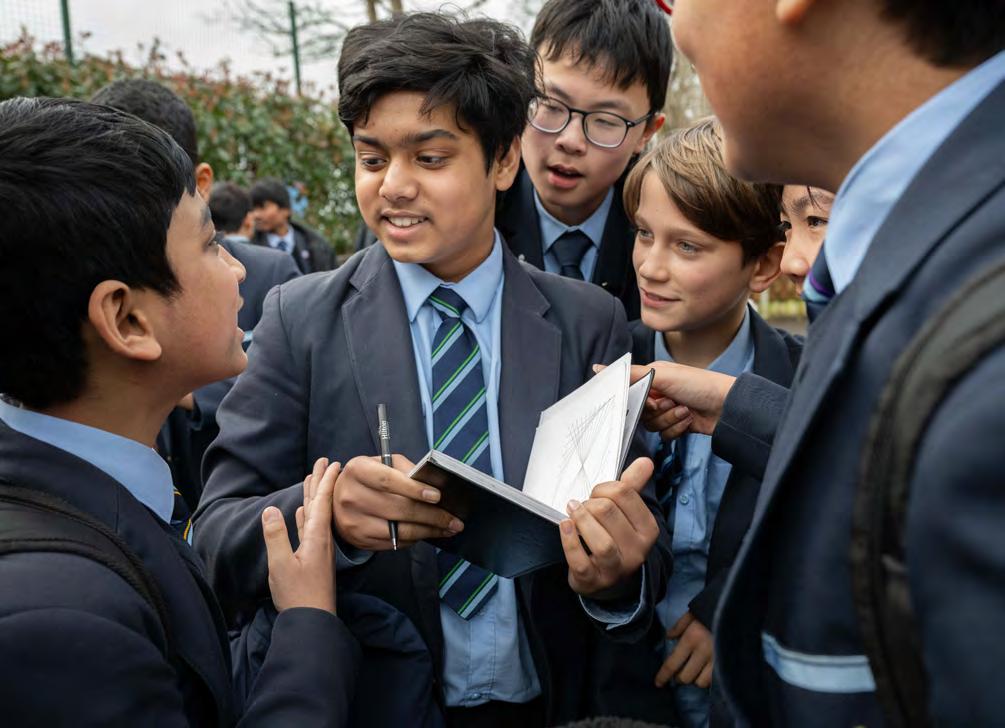
Economics
Economicsliesattheheartofmodernsociety,intersectingthevery differentworldsofgovernmentandbusiness.Alwayscurrentand relevant,itisconstantlychanging–alivingsubject–whichmakes itbothinterestingandchallenging.
TheEconomicsDepartmentoffersGCSEEconomicsinYears10and11and A-LevelEconomicsintheSixthForm.WhetheratGCSEoratA-level,weaim tostretchmoreablepupilstoexplorethesubjectbeyondthesyllabusspecification, whilealsoensuringthatallboysaregainingtheunderstandingneededtomaster thesyllabus.PupilsareencouragedtopursueEconomicsatdegreelevel,whether onPureEconomicscoursesorcombinedwithanothersubject.
ThroughstudyingEconomics,boysdevelopskillsinindependentlearningandin analyticalandcriticalevaluation,whichtheywillbeabletoapplyatthenextstage oftheirstudies.
WeseektocultivateaspiritofcuriositythatextendsintoareassuchasPolitics, Geographyandsocialbehaviour:pupilscanthenusethisknowledgeinconsidering currentaffairs,exploringthereal-worldapplicationofeconomictheory.
TechnologyisincreasinglybeingusedbytheEconomicsdepartmentinorderthat boyscanuseelectronicnotes,videosandresearchsitestostudyeconomictheory independently,whilstinclasswefocusonitsapplication,ontheunderstanding ofcurrenteconomicissuesandonexaminationtechnique.
GCSE:Years10–11(KeyStage4)
Pleasefollowthelink: OCREconomicsGCSE(9-1)(J205)
A-level:Years12–13(KeyStage5)
Pleasefollowthelinks: PearsonEdexcelAS-levelEconomics(8ECO) PearsonEdexcelA-levelEconomics(9ECO)
English
OuraspirationforthestudyofEnglishisthatitshouldofferboysa wayofunderstandingpeople,withalltheiremotionsandmotivations; ofunderstandingourcountryanditsvastliteraryheritage;andof understandingthewiderworld,withitsdiverseinter-relationships andmodesofcommunication.
Literaturestartswithplotandcharacter,butweshowpupilsthatthereisalsoacraft behindtextsthatwecanenjoystudyingandusetounderstandtheworldaroundus. Welookathowtextsarewritten,thechoicesthatwritersmakeandhowcomparisons canbemadebetweenvariousapproaches.Webelievethattextsshouldnotjustbe readonapage;the‘performancetext’isacrucialpartofwhatwedo.Wearekeen forpupilstolearnabouttextsthroughcreativeexploration,andteachersbalance closetextualanalysiswithavarietyofimaginativetasksdesignedtoenhance enjoymentandunderstanding.ShakespeareisstudiedintheLowerSchool, atGCSElevelandintheSixthForm.
Ourprioritiesincludeenablingourboystobecomeexcellentcommunicatorsofthe spokenword.Englishlessonsarebasedontheessentialityofdiscussinganddebating issuesateveryopportunity.Thataimextendstoallpupils:wehelpthosewhodo notnecessarilyseethemselvesasthewitorentertainerinagrouptofindtheirlevel, tobecomemoreconfidentandtocommunicateverballyinawaythatsuitsthem.
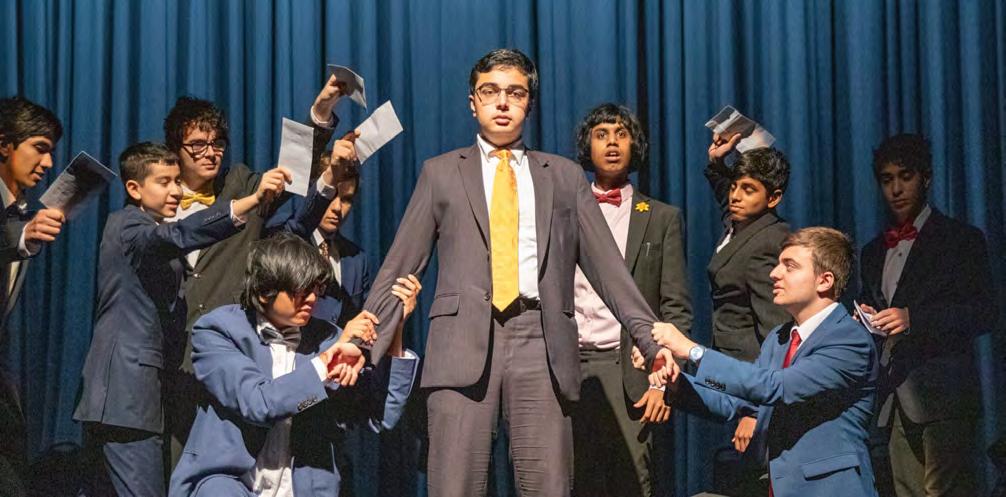
LowerSchoolEnglish:Years7–9(KeyStage3)
ThelowerschoolcurriculumhereatQueenElizabeth’s isdesignedtodevelopthefollowingskills
• Academicintegrity
• Assimilationofinformation
• Analysisandsynthesis
• Concentration
• Constructingandsupportingarguments(inwriting andorally)
• Criticalthinking
• Open-mindedness
• Planning
• Problemsolvingandcreativity
• Progressiveindependence
• Reflection
• Researchandreferencing
• Resilienceandresourcefulness
• Revision
Specifically,theEnglishcurriculumwilldevelop
• Anenthusiasmandenjoymentforallaspects ofEnglish,includingthereadingofchallenging literature,writingcreativelyandpurposefully, andspeakandlisteninginformatively.
• Theabilitytomakeinferencesandappreciatethewider implicationsofandconnectionswithinliterarytexts.
• AccesstothefullrangeoftextsintheEnglishcorpus, fromShakespearetocontemporarytexts.
• Astrongbackgroundinspelling,punctuation, andgrammar.
• Theabilitytocommunicateinarangeofdifferent formsandstyles,rangingfromformalessaysto projectbasedlearning.
• Independenceofstudythroughnote-taking, particularlywhenconcurrentlyengagingin oraldiscussion.
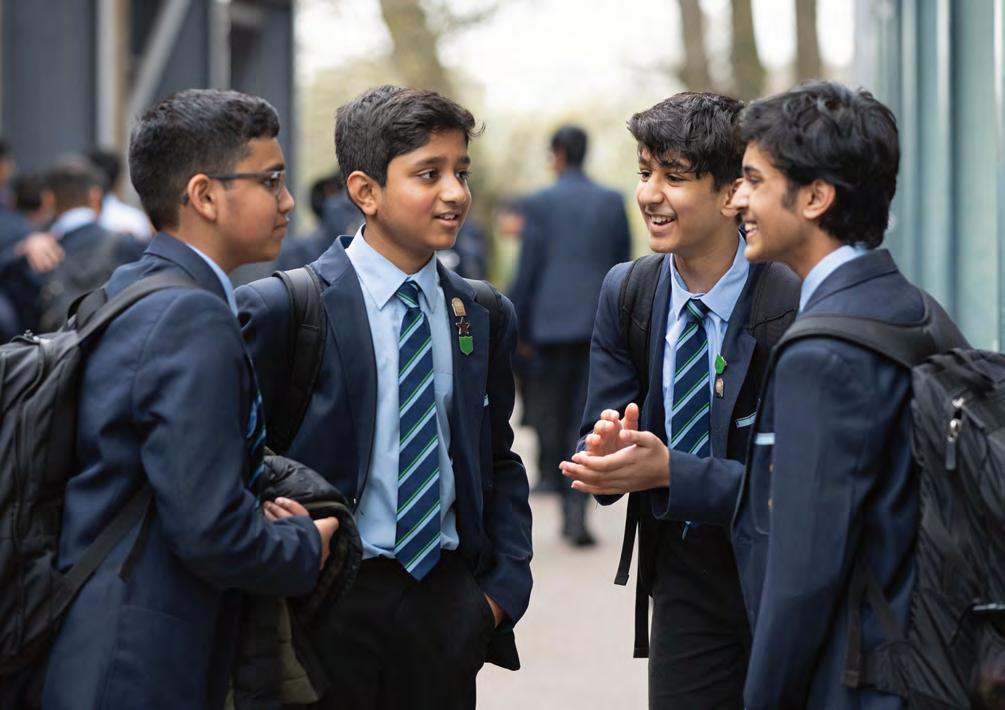
LowerSchoolEnglish:Years7–9(KeyStage3)
Non-fictionreading Usingautobiography toestablishasense ofpersonalidentity.
LiteraryHeritage
IntroducingVictorian literaturethroughCharles Dickens’ AChristmasCarol.
SpokenLanguage
Developingdebatingskills throughoralandwritten practice
Poetry
Exploringexperiences ofchildhood.
21st CenturyDrama
Exploringthecharacters andstagecraftof The Empress byTanikaGupta.
20th CenturyFiction Exploringthemodern worldthrougharange ofdiverseshortstories.
20th CenturyFiction
Exploringcharactersand characterisationthrough LordoftheFlies.
Shakespeare Anintroductionto Shakespeare’sthemes through Macbeth.
SpokenLanguage Developingskills indiscussionand collaborativedialogue.
Poetry
Exploringtheworkand themesofCarolAnnDuffy.
Non-fictionreading Developing analytical readingskillsthrough natureandtravelwriting.
LiteraryHeritage Exploringdiversefolklore throughthe 1001Nights.
CreativeWriting
Developingtechnicalability andpersonalvoicethrough creativewriting.
Shakespeare
Exploringthecharactersand themesof TheTempest
Non-fictionwriting
Furtherdevelopmentof writingskillsforaudience, impact,andpurpose.
Poetry
Exploringhumanity’s relationshipwiththe naturalworld.
LiteraryHeritage
ExploringtheGothic throughaseriesof shortstories.
LiteraryHeritage Developingfurther understandingofthe GothicthroughMary Shelley’s Frankenstein
GCSE:Years10–11(KeyStage4)
Pleasefollowthelinks:
OCREnglishLanguageGCSE(J351)
OCREnglishLiteratureGCSE(J352)
A-level:Years12–13(KeyStage5)
Pleasefollowthelink:
OCREnglishLiteratureA-level(H472)
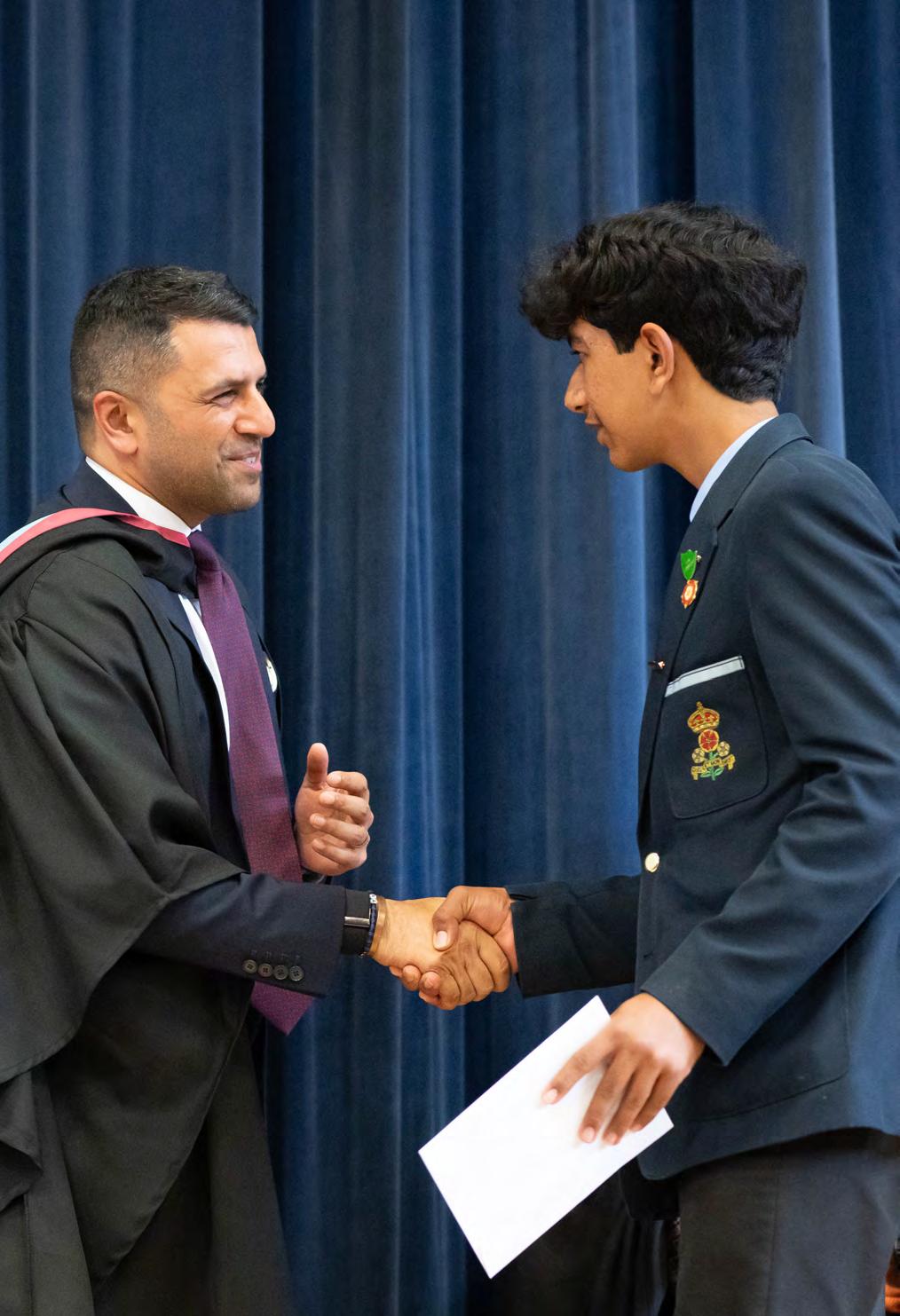
French
Melodiousandrich,Frenchis,withgoodreason,calledthelanguage oflove,butitisalsovibrantandmodern–thechosenmedium ofmanyoftheculturalandcommercialélitesofthe21stcentury.
ItwasforcenturiesthearistocratictongueemployedintheEnglishand otherEuropeancourts;Frenchtodayremainsanofficiallanguageofthe UnitedNations,theEuropeanUnion,UNESCO,NATO,theInternational OlympicCommittee,theInternationalRedCrossandinternationalcourts. Itisforthesereasonsthatourlowerschoolcurriculumaimstoencourage aloveanddevelopapassionforthecultureandlanguageoftheFrench speakingworld.
FranceisakeyeconomicpartnerfortheUK:learningFrenchopensdoors forjob-seekersinFranceitselfandinSwitzerlandandBelgium,too. FacilityinFrenchisanessentialskillforpupilsinterestedinstudyingat leadingFrenchuniversitiesandbusinessschools,whicharerankedamong thetophighereducationinstitutionsinEurope.Moreover,theFrancophone worldextendswellbeyondtheContinent:thereareopportunitiesinCanada, whileFrenchisanofficiallanguageinhalfofthetenfastest-growing countriesinAfrica.
GCSE:Years10–11(KeyStage4)
Pleasefollowthelink: AQAFrenchGCSE(8652)
A-level:Years12–13(KeyStage5)
Pleasefollowthelinks: AQAFrenchAS-level(7651) AQAFrenchA-level(7652)
LowerSchoolFrench:Years7–9(KeyStage3)
ThelowerschoolcurriculumhereatQueenElizabeth’s isdesignedtodevelopthefollowingskills
• Academicintegrity
• Assimilationofinformation
• Analysisandsynthesis
• Concentration
• Constructingandsupportingarguments(inwriting andorally)
• Criticalthinking
• Open-mindedness
• Planning
• Problemsolvingandcreativity
• Progressiveindependence
• Reflection
• Researchandreferencing
• Resilienceandresourcefulness
• Revision
Specifically,theFrenchcurriculumwilldevelop PracticalSkills
• Inferenceofmeaning
• Criticalthinking
• Communicationskills
• Activelisteningskills
• Activereadingskills
• Applyingparadigmstonewknowledge
• MetalanguageforLanguagelearning
• Patternrecognition
• Creativewriting
• Abilitytorecognisesoundpatterns
• Memorisationtechniquesandstrategies
• Researchskills
• Abilitytotranslateandrendermeaningwithaccuracy
• KnowledgeoftheFrenchspeakingworld,itsculture andhistory
• Globalcitizenship
Professionsandfuture plans/ambitions
Holidays(conditional tense)
Rightsand responsibilities
Culturalproject
Geography
Geographyisabroad-basedsubject.Itisinherentlymultidisciplinary inaworldthatincreasinglyvaluespeoplewhohavetheskills neededtoworkacrossthephysicalandsocialsciences.AtQE, boysareprovidedwithanexpansivegeographicaleducation thatisup-to-dateandrelevant;theythuslearntorecognise thevalueofGeographyintacklingmanyofthechallenges theworldcurrentlyfaces.
Weaimtoengenderaspiritofenquiry,nurturinginpupilsanunderstanding andappreciationofthediversityofEarth’sphysicalandhumanenvironments, andtheinterrelationshipsbetweenthem.Geographythusteachesboys aparticularwayofviewingtheworld,enablingthemtoconsiderissues fromaholisticperspectiveandtoreflectupontheirownplaceinsociety –ontheirvalues,theirrightsandtheirresponsibilitiestowardsother peopleandtheenvironment.
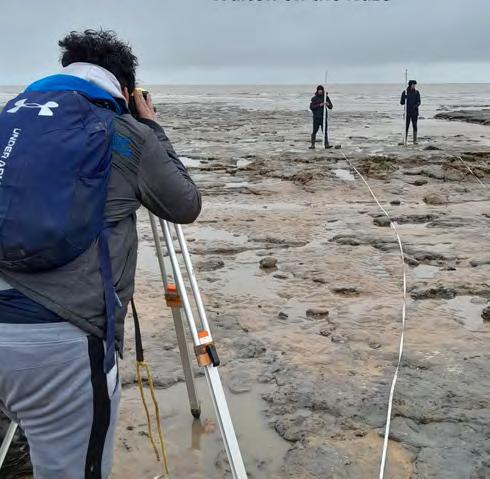
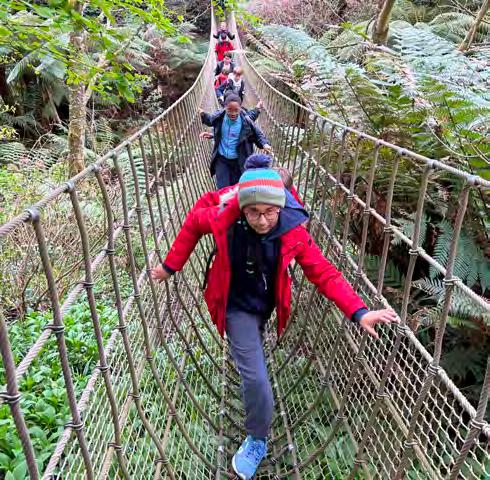
LowerSchoolGeography:Years7–9(KeyStage3)
ThelowerschoolcurriculumhereatQueenElizabeth’s isdesignedtodevelopthefollowingskills
• Academicintegrity
• Assimilationofinformation
• Analysisandsynthesis
• Concentration
• Constructingandsupportingarguments (inwritingandorally)
• Criticalthinking
• Open-mindedness
• Planning
• Problemsolvingandcreativity
• Progressiveindependence
• Reflection
• Researchandreferencing
• Resilienceandresourcefulness
• Revision
Specifically,theGeographycurriculum willdevelop
Geographicalskills
• Cartographic
• Constructingevidencedarguments
• Decisionmaking
• Fieldwork
• GeographicalInformationSystems(GIS)
• Graphical
• Numericalandstatistical
• Synoptic/holisticthinking
Geographicalconcepts
• Attitudesaffectactions
• Causation(long/shortterm,trigger/background)
• Change(spatial,temporal)
• Interconnectionsandinterdependency
• Nature-societyinteractions
• Place
• Players,powerandperspectives
• Scale(local,national,international,global)
• Sustainability
• Systemsandfeedback
Geographicalknowledge
• Locationalknowledge
• Processesinphysicalandhumangeography
• Contemporarygeographicalissues (includingclimatechange,environmentalchallenges facingecosystemsincludingtheoceans,resource management,migration).
Themesexploredinthelowerschool:
MyplaceintheWorld
Developingmappingskillsandasense ofplace.
Weatherandclimate
Describingandexplainingclimates andextremeweatherevents.
GlobalSociety
Exploringhumanprocessesand systemsandhowtheychange bothspatiallyandtemporally.
Changinglandscapes
Exploringphysicalprocessesandsystems, howtheychange,andhowpeopleinteract withthematarangeofscalesandina rangeofplaces.
EcosystemsoftheWorld
Exploringphysicalprocessesandsystems innamedbiomesandhowpeopleinteract withthem.
Globalissues
Investigatingcontemporary geographicalissues.
LowerSchoolGeography:Years7–9(KeyStage3) Year7
Year9
Theme
1
2
MyWorld InvestigatingtheUKand theprocessesthatshape ourcountry
MappingtheUK Howcanyoudescribe whereyouare?
Rivers Whyarerivers important?
Population Wholiveshere?
3
4
5
6
WeatherandClimate Whatdetermines ourweather?
Settlements Howandwhydoour settlementsdiffer?
Temperate DeciduousForests WhatistheUK’s biomelike?
GCSE:Years10–11(KeyStage4)
Pleasefollowthelink: AQAGeographyGCSE(8035)
A-level:Years12–13(KeyStage5)
Pleasefollowthelink: PearsonEdexcelA-levelGeography(9GEO)
ChangingWorld Investigatingthe processesthat changeourworld
ClimateChange Howisourclimate changing?
Coasts Whatisshaping ourcoastlines?
Migration Whydopeoplemove betweenplaces?
Oceans Howareouroceans changingandwhy doesitmatter?
GeographyofFood Whatareweeating andwhy?
SustainableLiving Areourlifestyles sustainable?
FutureWorld Investigatingwhat ourworldmaybe likeinthefuture
Development Willthedevelopment gapnarrow?
Tectonics Howaretectonicforces changingourworld?
TropicalRainforests Aretropicalrainforests importanttoour planet’sfuture?
Superpowers Whichcountrywillbe themostpowerful inthefuture?
UrbanChallenges
UrbanChallenges
German
SpokenasanativetonguebymorepeoplethananyotherEuropean language,Germancontinuestoplayanimportantroleinmany academic fields,and figuresfromGermansocietyhavelongbeen significantinboththeartsandthesciences.TheGermancurriculum, therefore,aimstointroducestudentstothelanguageandculture oftheGermanspeakingworldandenthusestudentsaboutit.
Twenty-twoNobelPrizesinPhysics,30inChemistryand25inMedicinehave beenawardedtoscientistsfromGerman-speakingcountries.AndGerman wasspokenbysuchluminariesasGoethe,Marx,Nietzsche,Kafka,Mann, Brecht,Mozart,Bach,Beethoven,Mendelssohn,Schubert,Brahms, Schumann,WagnerandMahler–tonamejustafew.
TheGermaneconomyisoneofthestrongestinEurope,andGermanyisthe world’s second-largestexporter,withanenviablereputationbothforinnovation and forexcellenceinengineeringandotherfields.
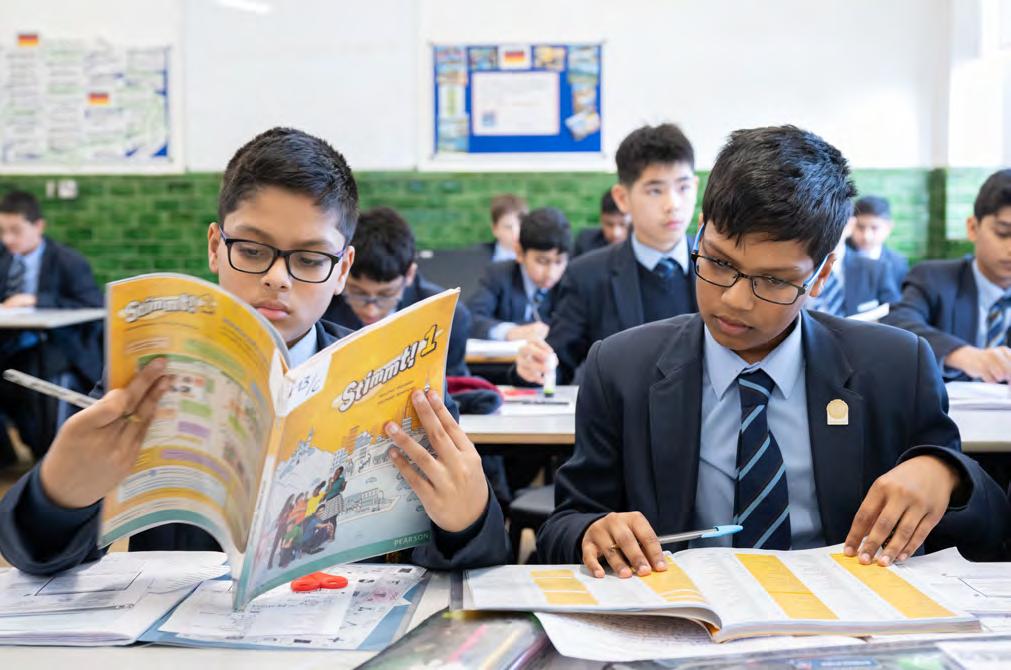
LowerSchoolGerman:Years7–9(KeyStage3)
ThelowerschoolcurriculumhereatQueenElizabeth’s isdesignedtodevelopthefollowingskills:
• Academicintegrity
• Assimilationofinformation
• Analysisandsynthesis
• Concentration
• Constructingandsupportingarguments (inwritingandorally)
• Criticalthinking
• Open-mindedness
• Planning
• Problemsolvingandcreativity
• Progressiveindependence
• Reflection
• Researchandreferencing
• Resilienceandresourcefulness
• Revision
GCSE:Years10–11(KeyStage4)
Pleasefollowthelink:
A-level:Years12–13(KeyStage5)
Pleasefollowthelinks:
Specifically,theGermancurriculum willdevelop:
• Inferenceofmeaning
• Criticalthinking
• Communicationskills
• Activelisteningskills
• Activereadingskills
• Applyingparadigmstonewknowledge
• MetalanguageforLanguagelearning
• Patternrecognition
• Creativewriting
• Abilitytorecognisesoundpatterns
• Memorisationtechniquesandstrategies
• Researchskills
• Abilitytotranslateandrendermeaningwithaccuracy
• KnowledgeoftheGermanspeakingworld,itsculture andhistory
• Globalcitizenship
History
Historyisastudyofthepeopleandoftheworldaroundus;human beingsmayhavebeenbornindifferentcontextsanddifferenteras, buttheyhadthesamehopes,dreamsandfearsasmenandwomen alivetoday.Inourcomplex21st-centuryworld,recognisingcontinuity canhelpusseetowardsthefutureandbetterunderstandourselves.
AtQEweseektodevelopcriticalthinkingandwritingskills,trainingboysto formanddefendtheirownviewpointsandbroadentheirintellectualhorizons. Thesearecrucialfordealingwiththeworldaroundus–forsiftinginformationto distinguishbetweenopinionandfactandtoidentify‘fakenews’.ThereforeatQE weencouragepupilstobecomelifelonglearnersandforanythingthatrequires intelligent,analyticalandflexiblethinkers.
Learningaboutthedepthstowhichhumanityhassunkcanbedifficult,justas discoveringthegreatfeatsmankindhasaccomplishedcanlifthopeforthefuture. Byteachingpupilsaboutboth,wehelpthemunderstandwhatitistobecitizens oftheworldandencouragethemtoseebeyondthemselves.Thestudyofhistory contributestothedevelopmentofinformed,tolerantandrespectfulyoungadults whounderstandtherootofpeople’sdifferencesandthecontextualnatureofthe currentworld,andwhoareabletoseethingsfromdiverseperspectives.
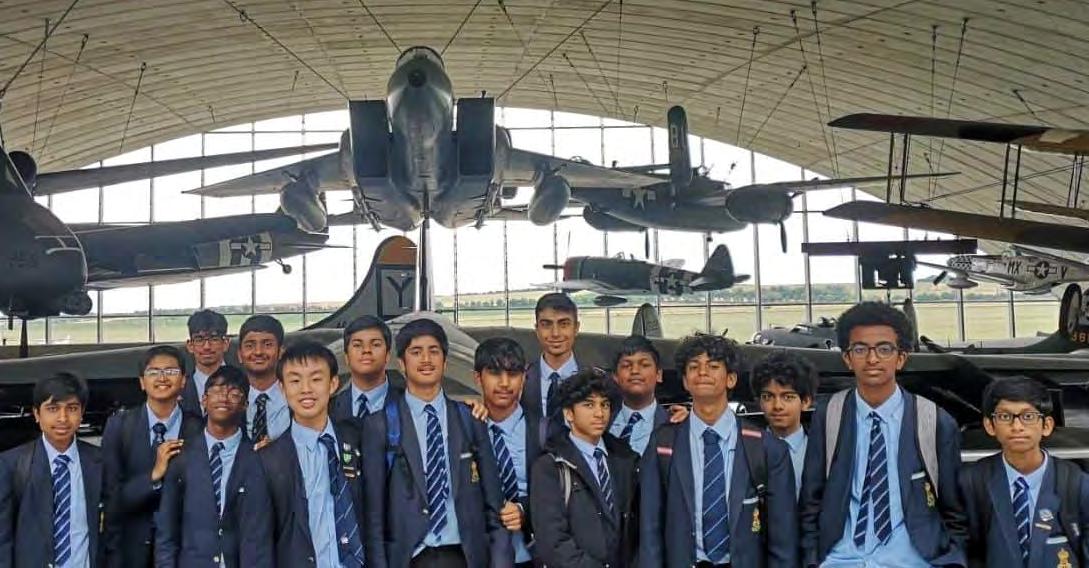
LowerSchoolHistory:Years7–9(KeyStage3)
ThelowerschoolcurriculumhereatQueenElizabeth’s isdesignedtodevelopthefollowingskills:
• Academicintegrity
• Assimilationofinformation
• Analysisandsynthesis
• Concentration
• Constructingandsupportingarguments (inwritingandorally)
• Criticalthinking
• Open-mindedness
• Planning
• Problemsolvingandcreativity
• Progressiveindependence
• Reflection
• Researchandreferencing
• Resilienceandresourcefulness
• Revision
AncientAfricankingdomsand AncientRome–Government, society,religion/culture,identity andtechnology.
MedievalEuropeandBritain –Government,society,religion/ culture,nationalidentity,technology.
ModernBritainandtheriseof America–Government,society, religion/culture,nationalidentity, Technology.
Historicalenvironmentstudy–The historyofQueenElizabeth’sSchool.
GCSE:Years10–11(KeyStage4)
Pleasefollowthelink: AQAHistoryGCSE(8145)
A-level:Years12–13(KeyStage5)
Pleasefollowthelink: AQAHistoryAS&A-level(7041&7042)
Specifically,theHistorycurriculum willdevelop:
Historicalskills
• Sourceinference
• Sourcereliability/utility
• Differencebetweendescriptionandanalysis
• PEEL
• Constructingandcritiquinganargument
• Vocabularyandliteracy
• Evaluatinginterpretation/convincingness
Historicalconcepts
• Periodisation/time
• Anachronism
• Change
• Nationalidentity
• Society Historicalknowledge
• Britishhistory
• Worldhistory
• Changeandcontinuity
Latin
Alongwiththeknock-onbenefitsforothersubjects,(inparticular, modernforeignlanguagesandEnglish),thestudyofLatinisintrinsically rewardinginitself.SinceLatinisadeeplylogicallanguage,itsuits peoplewithamathematicalmind-setasmuchasthosewithanatural flairforlanguages.Asanintellectualexerciseitcanbechallenging butalsogreatlystimulatingforstudents.
LatinalsoprovidesafantasticintroductiontotheClassicalWorld.Itiswonderful foryoungerstudentstobeintroducedtoaworldofgladiatorsandlegionaries, todiscoverRomanBritainandgreatfigureslikeCaesarandNero.Latinclasses canengenderafascinationwithHistoryinstudentsthatcantaketheminall kindsofinterestingdirections.Forolderstudents,theintroductiontoLatin literaturecanberevelatory.
AtQueenElizabeth’s, wehaverecentlytransitionedtoanewtextbookcalled Suburani. ThisisawonderfulresourcetoteachcomprehensionoftheLatinlanguageforreading purposes,andsecondly,todevelopanunderstandingofthehistoryandcultureof Romancivilisation.Italsooffersexcellentdigitalresourcestohelpconsolidatelinguistic knowledge.
I findthegrammarrulesespeciallyinteresting; it’strueforallthelanguagesI’mstudying. I’mlearningtopayattentiontotheconjugation ofverbs,sothesentencemakessense.
TroyPena,2023leaver
LowerSchoolLatin:Years7–9(KeyStage3)
ThelowerschoolcurriculumhereatQueenElizabeth’s isdesignedtodevelopthefollowingskills:
• Academicintegrity
• Assimilationofinformation
• Analysisandsynthesis
• Concentration
• Constructingandsupportingarguments (inwritingandorally)
• Criticalthinking
• Open-mindedness
• Planning
• Problemsolvingandcreativity
• Progressiveindependence
• Reflection
• Researchandreferencing
• Resilienceandresourcefulness
• Revision
Spring1
Spring2
Book1(chapters 1–2) Thepresenttenseand basicsentencestructure. LifeinthecityofRome.
Book1(chapters2–3) Nominativesand accusatives. Entertainment andfestivals.
Book1(chapter 4) ‘we’and‘you’/ neuternouns. Romanreligion.
Book1(chapter 5) Infinitivesandirregular verbs.Romanbaths/ watersupply.
Book1(chapter 6) Theablativecase. Slavery.
Book1(chapter 7) Imperfectandperfect tenses. RomanBritain –Londiniumand invasionbytheRomans.
Specifically,theLatincurriculum willdevelop:
• Inferenceofmeaning
• Criticalthinking
• Communicationskills
• Activelisteningskills
• Activereadingskills
• Applyingparadigmstonewknowledge
• MetalanguageforLanguagelearning
• Patternrecognition
• Creativewriting
• Abilitytorecognisesoundpatterns
• Memorisationtechniquesandstrategies
• Researchskills
• Abilitytotranslateandrendermeaningwithaccuracy
• KnowledgeoftheClassicalworld,itscultureandhistory
Book1(chapter8) Perfecttense(cont’d) andsuperlatives. RomanBritain–rebellion /theDruids.
Book1(chapter9) Dativecase. Romanarmyand thecityofStAlbans.
Book1(chapter10) Adjectives. ThecityofBath.
Book1(chapter11) Thegenitivecase. Romansandthesea.
Book1(chapter12) Imperativesandthe vocativecase. TheGreatFireofRome.
Book1(chapter13) Relativeclauses. Romantowns –thecityofArles.
Book1(chapter14) Thefuturetense. Mosaicsandmining. Year9
Book1(chapter15) Directandindirect statements. Countryestatesand dinnerentertainment.
Book1(chapter16) Pronouns. Marriage.
Book2(chapter17) Pluperfecttense. Housingandtrade.
Book2(chapter18) Moreonthefuturetense andtheverb togo Citizenship.
Book2(chapter19) Presentparticiples. Deathandtheafterlife.
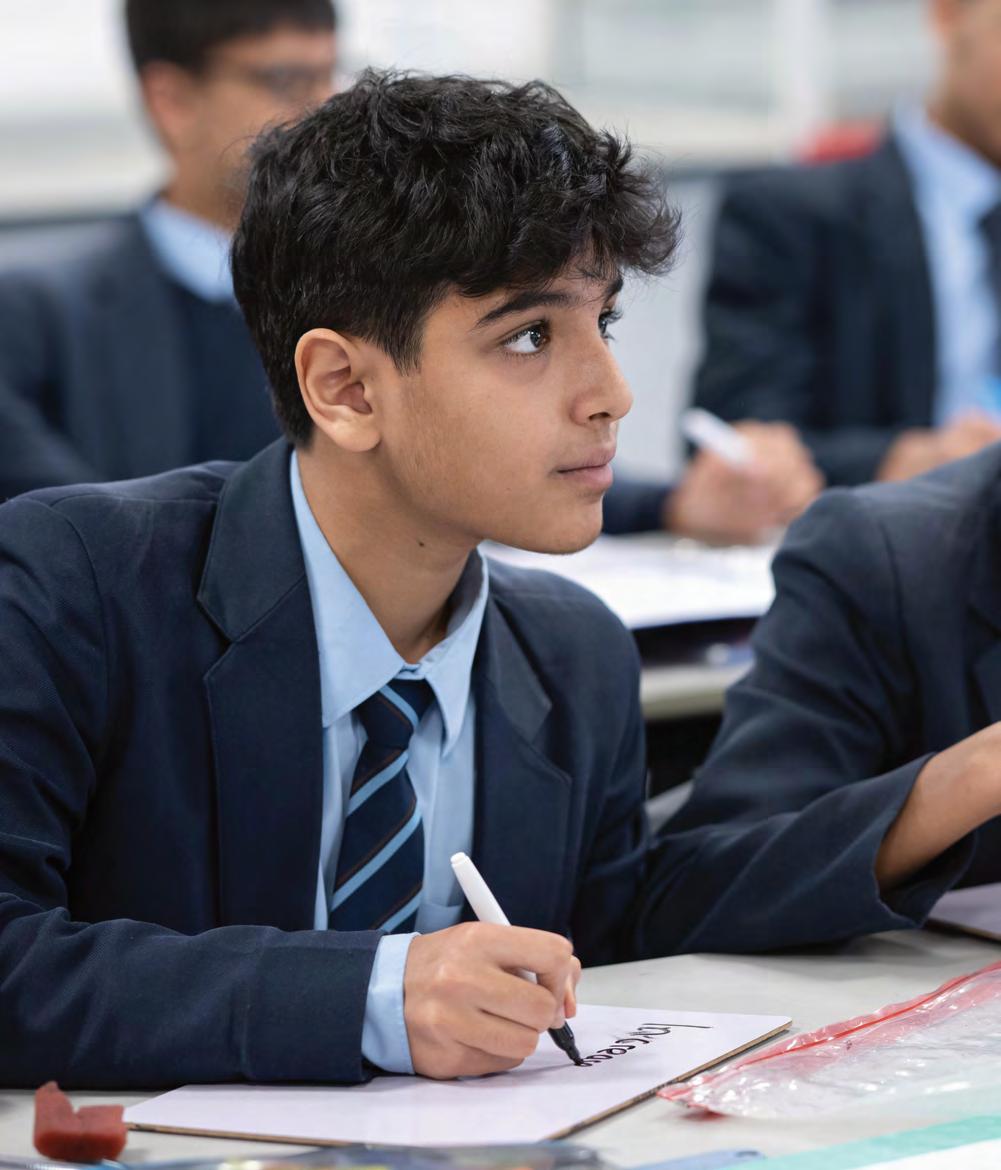
GCSE:Years10–11(KeyStage4)
Pleasefollowthelink:
OCRLatinGCSE(J982)
A-level:Years12–13(KeyStage5)
Pleasefollowthelink:
OCRLatinAS-Level(H043)
OCRLatinA-Level(H443)
Mathematics
WehopetoinstilinpupilsasenseofwonderathowMathematics explainsphenomenaintherealworld,whilsthelpingthemtobecome moreconfident,resilient,resourceful,creativeandcollaborative,as wellasdevelopingintobetterproblem-solverstoo.Eachyearwereceive anewcohortofYear7studentswhohavebeenselected,inpart,on thebasisoftheirmathematicalability.Theyareenthusiastic,confident andusedtosucceedinginMathematics.Asadepartment,weseeit asourresponsibilitytoensurethattheyremainengagedwiththe subjectandcontinuetoexcelastheyarepresentedwithincreasingly demandingchallenges.
Todothis,weseektodevelopconfidenceandaccuracyintheiruseof mathematicallanguageandtechniquestoproducesolutionstoproblems. Byrequiringrigourinsuchwork,webuildresilienceandresourcefulness. Creativityisnurturedthroughencouragingboystofindalternativesolutions, andweprovideopportunitiesforthemtocooperateandworkasateam.
Inallofthis,notonlydoweaimtoinculcatethatsenseofwonderand anenjoymentofmathematicaltheoremsfortheirownsake,butalso alife-longloveoflearningMathematicsamongstallourpupils.
GCSE:Years10–11(KeyStage4)
Pleasefollowthelink: PearsonEdexcelMathematicsGCSE(1MA1)
A-level:Years12–13(KeyStage5)
Pleasefollowthelinks: PearsonEdexcelMathematicsA-levelMathematics; FurtherMathematicsA-levelFurtherMathematics
LowerSchoolMathematics:Years7–9(KeyStage3)
ThelowerschoolcurriculumhereatQueenElizabeth’s isdesignedtodevelopthefollowingskills
• Academicintegrity
• Assimilationofinformation
• Analysisandsynthesis
• Concentration
• Constructingandsupportingarguments (inwritingandorally)
• Criticalthinking
• Open-mindedness
• Planning
• Problemsolvingandcreativity
• Progressiveindependence
• Reflection
• Researchandreferencing
• Resilienceandresourcefulness
• Revision
Number –workwithterminating decimals,fractionsandpercentages; understandorderofoperations; establishbasicnumberproperties.
Algebra –workwithcoordinates andhorizontalorverticallines; solvesimplelinearequations; workwithlinearsequences.
Geometry –workwithangles andpolygons;calculateareas; performreflections,rotationsand translations;workwithsimple measures(metricandimperial).
Statistics –calculatestatistics anduseandinterpretdiagrams forqualitativeandquantitative discretedata;calculatethe probabilityofsingleevents.
Specifically,theMathematicscurriculum willdevelop
Theschemeofworkformathematicsaimstoensure thatallpupils:
• Become fluent inthefundamentalsofmathematics, includingthroughvariedandfrequentpracticewith increasinglycomplexproblemsovertime,sothat pupilsdevelopconceptualunderstandingandthe abilitytorecallandapplyknowledgerapidlyand accurately;
• Reasonmathematically byfollowingalineofenquiry, conjecturingrelationshipsandgeneralisations,and developinganargument,justificationorproofusing mathematicallanguage;
• Can solve problems byapplyingtheirmathematics toavarietyofroutineandnon-routineproblems withincreasingsophistication,includingbreaking downproblemsintoaseriesofsimplerstepsand perseveringinseekingsolutions.
Wealsowantstudentstoenjoymathematicsforitsown sakeandtobuildupresiliencewhenfacingnewchallenges.
Number –workwithrecurring decimals,ratio,indicesand standardform.
Algebra –solvelinearequations involvingbrackets,fractionsand unknownsonbothsides;use numericalmethods;workwith quadraticsequences.
Geometry –performrotations, enlargementsandcombined transformations;usePythagoras’ theorem;identifycongruency; calculatevolumes;draw2D representationsof3Dsolids.
Statistics –useandinterpret diagramsforbivariatedata; useandinterpretcumulative frequency;calculatethe probabilityofcombinedevents anduseexperimentalprobability.
Number –solveproblemsusing skillslearntearlier.
Algebra –usetheformula forastraightline;solvesimultaneous linearequations;solvelinear inequalities;begintounderstand algebraicproof;rearrangeformulae.
Geometry –usetrigonometry; begintounderstandgeometrical proof;workwithcompound measures;identifysimilarity.
Statistics –implementthe handlingdatacycle;identify mutuallyexclusiveand independentevents.
Music
Inalmosteveryculturethroughouthistory,Musichasbeenan essentialpartofthehumanexperience. Itengagestheemotions, stimulatestheintellect,enablesself-expressionandevensometimes providesawelcomeescapefromreality.
AtQE,weaimtoprepareourpupilsforlifelongmusicallearningandappreciation. Throughmeaningfulmusicalexperiences,pupilsdeveloptheircharacter,creativity andculturalawareness.Ourcurriculumisdesignedtonurturepupilsasperformers, composersandinformedlisteners.Theyaretaughthowtoreadandwritemusic, howtoperformexpressivelyandhowtolistencriticallytoabroadrangeofstyles. Outsideoftheclassroom,theyhaveaccesstoawideselectionofensemblesand opportunitiestodemonstratetheirmusicianship.Ourstudentsthrive,both academicallyandpractically,inMusic.
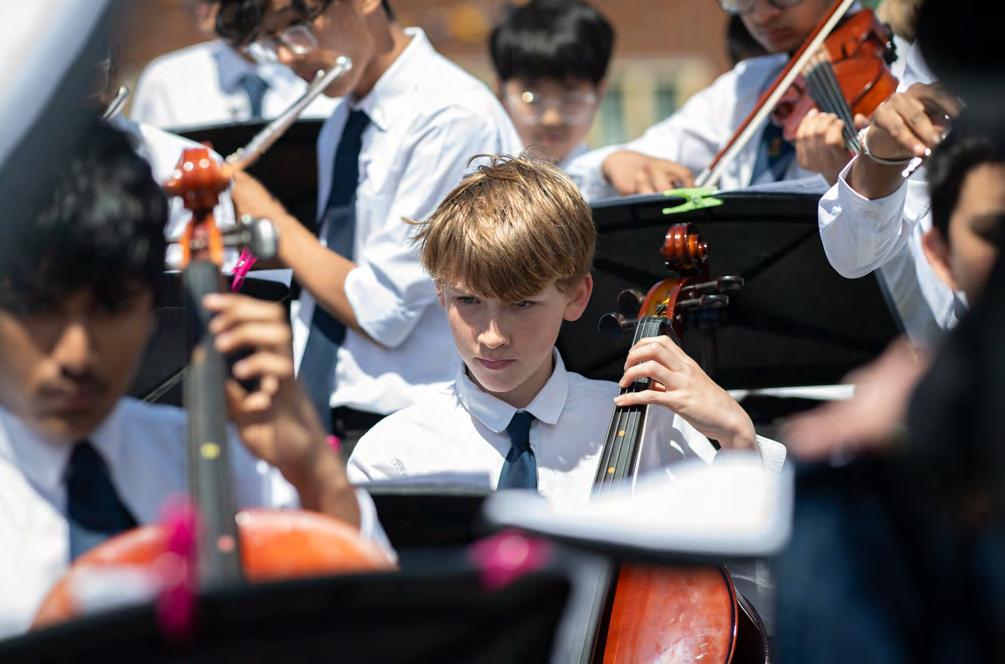
LowerSchoolMusic:Years7–9(KeyStage3)
ThelowerschoolcurriculumhereatQueenElizabeth’s isdesignedtodevelopthefollowingskills:
• Academicintegrity
• Assimilationofinformation
• Analysisandsynthesis
• Concentration
• Constructingandsupportingarguments (inwritingandorally)
• Criticalthinking
• Open-mindedness
• Planning
• Problemsolvingandcreativity
• Progressiveindependence
• Reflection
• Researchandreferencing
• Resilienceandresourcefulness
• Revision
Autumn1: TheoryofMusic
Autumn2: TheElementsofMusic
Spring: TheBaroquePeriod
Summer: TheClassicalPeriod
Specifically,theMusiccurriculumwilldevelopskills including:
• Performingusinginstrumentsandtheirvoices
• Improvisingwithinstylisticparameters
• Composingwithincreasingtechnicalability
• Listeningandappraising
• Eartraining
• Sight-reading
• Analysisofscoresandrecordings
• Ensembleawareness
Autumn: TheRomanticPeriod
Autumn: FilmMusic
Spring: VocalMusic
Summer: TheBlues
GCSE:Years10–11(KeyStage4)
Pleasefollowthelink: PearsonEdexcelMusicGCSE(1MUO)
A-level:Years12–13(KeyStage5)
Pleasefollowthelinks: PearsonEdexcelMusicAS-levelandA-level(9MUO)
Spring: Minimalism
Summer: PopularMusic
Philosophy,Religion&Society
ForthePhilosophy,Religion&Societydepartment,thediversity ofourcomplexworld,withitswidearrayofbeliefsystems andworldviews,issomethingtobecelebratedandexplored. Asboysdevelopanappreciationofthatworld,theylearntoengage criticallywithit,nottakingideasforgranted,andtonavigateit withempathy.Pupilsareencouragedtoreflectcarefullyontheirown beliefsinrelationtothosestudied.Theancientmaxim,‘knowthyself’, isaguidingprincipleforhowweexpectboystoengagewithstudies. Whenteachingatopic,weencouragetheviewthattheremay benoonecorrectanswer–whichdoesnot,ofcourse,mean thattherearenoincorrectanswers.
IntheLowerSchool,weintroduceboystokeyconcepts–lookingatthenature ofphilosophicalenquiry,theanalysisofargumentandcriticalthinkingskills –andtowaysofengagingwithmajorsocietalissues,sotheycanbetter understandtheworldaroundthem.
ThisapproachisdevelopedinYear10,withstudentsworkingonanHPQthroughout theyear.Thisisaresearchproject,assessedbyAQA,whichculminatesinapiece ofextendedwriting.Studentsaretaughtkeyskillsrequiredforindependentstudy, alongsidetopicsfromPhilosophy,ReligionandSociety.
IntheSixthForm,aPhilosophyA-levelisoffered.Pupilsgainanunderstanding ofmajorissuesinPhilosophy,whileuniversity-styleseminarsessionsgive themtheopportunitytoengageindependentlywithcomplexideasandto communicatetheirownunderstandingclearlyandpersuasivelytotheirpeers.
Inbroadeninganddeepeningstudents'knowledgeofother people’sfaithsandworld-views,Ihopestudentscanbetter empathisewiththosewhomayat firstglancehaveradically differentperspectives,andseesuchdifferencesasopportunities forlearningandcelebrationratherthandivision.
MrJackRobertson,HeadofPhilosophy,Religion&Society
LowerSchoolPhilosophy,Religion&Society: Years7–9(KeyStage3)
ThelowerschoolcurriculumhereatQueenElizabeth’s isdesignedtodevelopthefollowingskills:
• Academicintegrity
• Assimilationofinformation
• Analysisandsynthesis
• Concentration
• Constructingandsupportingarguments (inwritingandorally)
• Criticalthinking
• Open-mindedness
• Planning
• Problemsolvingandcreativity
• Progressiveindependence
• Reflection
• Researchandreferencing
• Resilienceandresourcefulness
• Revision
Specifically,thePhilosophy,ReligionandSociety curriculumwilldevelop:
• Progressiveindependence
• Focusedresearch
• Referencing
• Essay
• Argumentation
• Presentation
• Criticalthinking
• Open-mindedness
• Problemsolvingandcreativity(groupwork)
• Textanalysis(includinghermeneutics)
• Religiousliteracy
• Conceptualanalysis
Community
Spirituality
Rights
Plato
Whatisreligion?Anintroduction
Inspirationalpeople
Wealthandpoverty
Religionandscience
Democracy
God,truthandlogic
Theproblemofevil
JSMill
TheAbrahamicreligions
Whatisreligion?Goingfurther
Dharmicphilosophy
Sociologyofthemedia
HPQideas
Aristotle
Year10(KeyStage4)
TheHigherProjectQualificationbeguninYear9continues.Thisinvolvesboysundertaking anextendedindependentresearchtaskfocusedonamoral,ethical,socialorreligious enquiryoftheirownconception.
Pleasefollowthelink: AQAHigherProjectQualification(from2020)(7992)
A-level:Years12–13(KeyStage5)
Pleasefollowthelink: AQAA-levelPhilosophy(7172)
PhysicalEducation/Games
FundamentalmovementskillsaretaughtduringYears7–9. Alongsidethis,weseektodevelopcommunicationskillsand, throughteamandindividualsports,tonurtureleadershipand resilience.Competitionisimportant:throughGameslessonsas wellasextra-curricularactivities,QEboysareexposedtomany opportunitiestotestthemselvesagainstothers,includingintra-school andinter-schoolcompetitions.TechnologyisusedinPEtopromote peerandself-assessmentandtotrackandmeasureprogress.
Ourambitionistoempowerthepupilsinourchargewiththeconfidenceto succeedoncetheyleavetheSchool.They,therefore,developtheabilitytoreflect, tochallengeandtoplanforalifelongparticipationinsportandphysicalactivity. Boysareencouragedtoexploreandfurtherdeveloptheirsportingabilities atQEthroughawidearrayofextra-curricularandenrichmentopportunities.
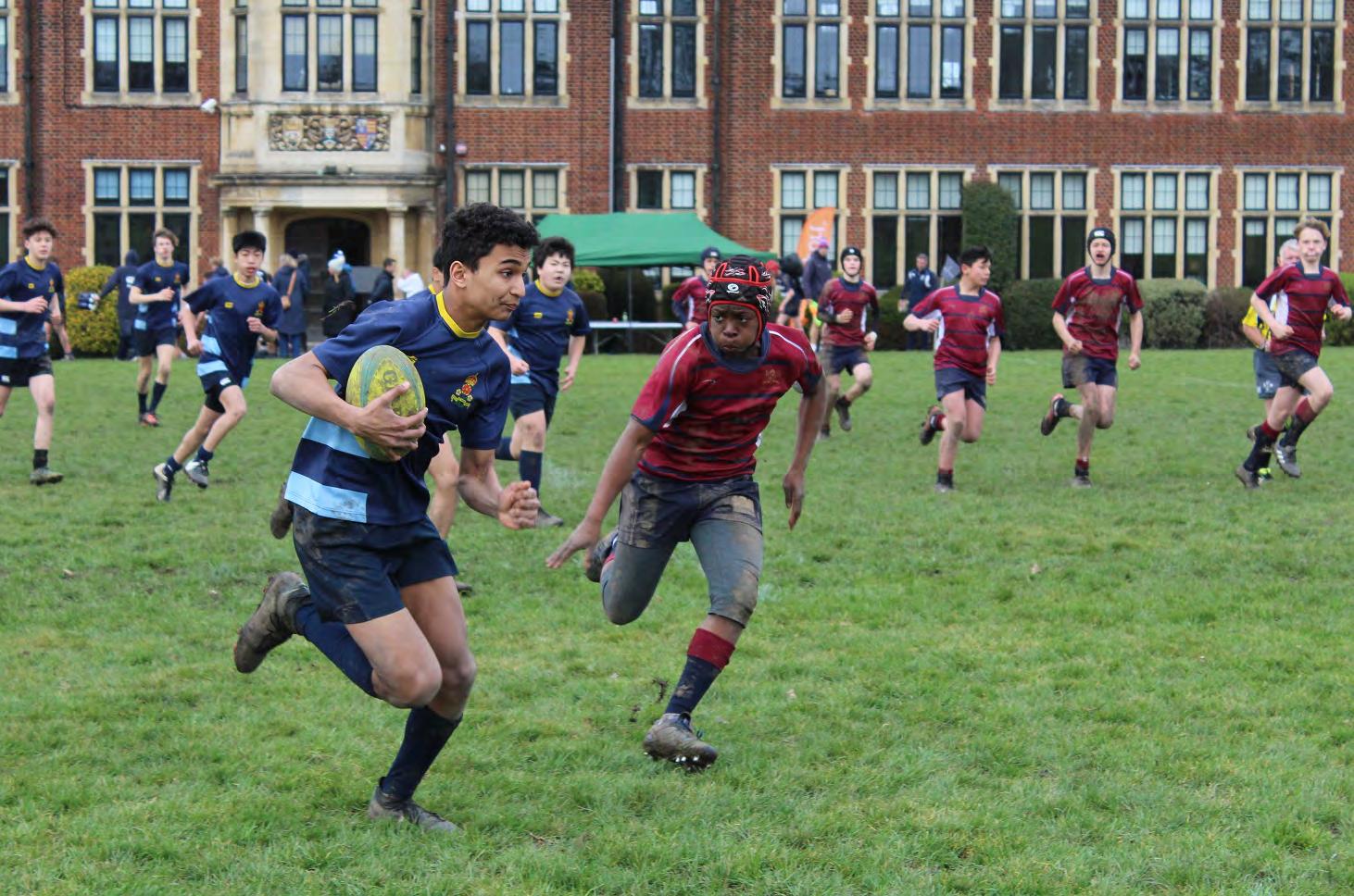
PhysicalEducation/Games: Years7–9(KeyStage3)
TheKeyStage3curriculumhereatQueenElizabeth’s isdesignedtodevelopthefollowingskills:
• Academicintegrity
• Assimilationofinformation
• Analysisandsynthesis
• Concentration
• Constructingandsupportingarguments (inwritingandorally)
• Criticalthinking
• Open-mindedness
• Planning
• Problemsolvingandcreativity
• Progressiveindependence
• Reflection
• Researchandreferencing
• Resilienceandresourcefulness
• Revision
Specifically,thePE/Gamescurriculumwilldevelop fourlearningoutcomes
Physical
• Developmovementcompetency
• Improve/developfitnesslevels
• Learnnewskillsrelatingtomovement
• Decisionmaking
Cognitive
• Understandingthebenefitsofmovement
• Subjectknowledge-increaseSKthroughhomework andtasksetting.
• Problemsolving–haveacleardistinctionbetween gamesandcorePE;corePEtofocusondecision makingratherthanskills
• Leadership–givendifferentrolestoresultinbetter engagementinphysicalactivity.
Social
• Buildingacommunityofmovement
• Fun/enjoyment–pupilstohaveawanttocontinue beingphysicallyactivethroughoutlives
• Communication&interaction
Affective
• Establishthebehavioursofmovement
• Physicallyliterate–pupilstounderstandmoreabout thepotentialoftheirbodyandstarttolearnthrough meta-cognition(thinkingaboutthinking).
PhysicalEducation/Games: Years10–11(KeyStage4)
ThenewQueenElizabeth’sKeyStage4PEcurriculumbuildsontheskills developedinKeyStage3.Thecurriculumisbroad,andisconsideredasthe nextstageofpupils’physicaldevelopment.Itequipsthemwithwiderskills toutiliseastheymoveforwardintheiracademiccareers,whilealso promotingindependentthinkingandco-operativelearning.
Pupilswill:
• Learnhowtouseanddevelopavarietyoftactics andstrategiestoovercomeopponentsinteamand individualgames;
•Developtheirtechniqueandimprovetheir performanceinothercompetitivesports;
•Takepartinfurtheroutdoorandadventurousactivities inarangeofenvironmentswhichpresentintellectual andphysicalchallenges,andwhichencouragepupils toworkinateam,buildingontrustanddeveloping skillstosolveproblems,eitherindividuallyorasagroup;
•Learnhowtoevaluatetheirperformancescomparedto previousperformancesanddemonstrateimprovement acrossarangeofphysicalactivitiestoachievetheir personalbest;
•Engagewithourlocalpartnershipprimaryschoolsto putintopracticetheskillslearntacrossthekeystage.
InYears10-11,weassesspupilsbased onthefollowingcomponents:
•Communication
•Engagement
•Leadership
•Teamwork
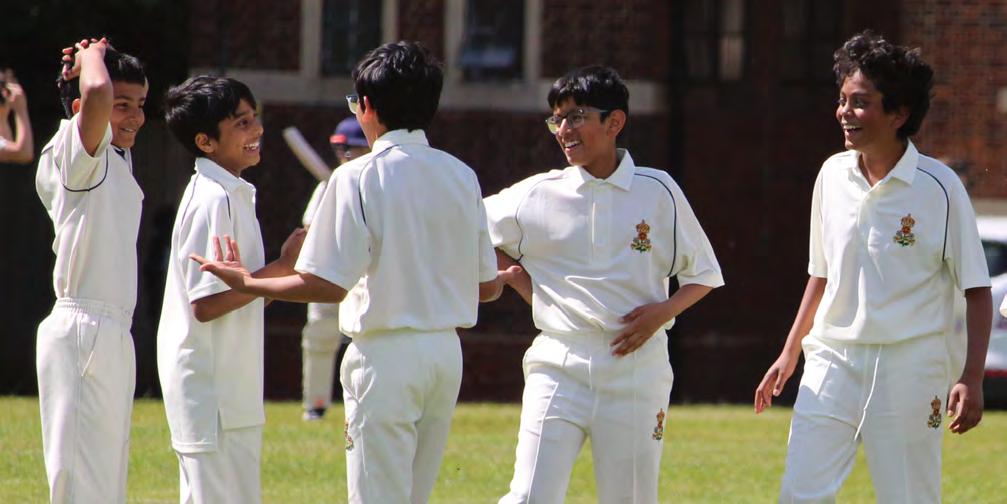
Politics
Politicslessonsaimtoencouragedebateandtoinculcate acritical,questioningapproachtotheworldandtothe individual’sroleinsociety.
Pupilscanexpecttohavetheirviewschallengedandmustbewillingtoexplain theirapproach.Discussionsfrequentlycontinueafterboysleavetheclassroom!
PoliticsisanA-levelcourseandis,therefore,taughtonlyintheSixthForm. Itnaturallyleadsontohighlyregardeduniversitycourses,includingPPE (Philosophy,PoliticsandEconomics)andLaw.
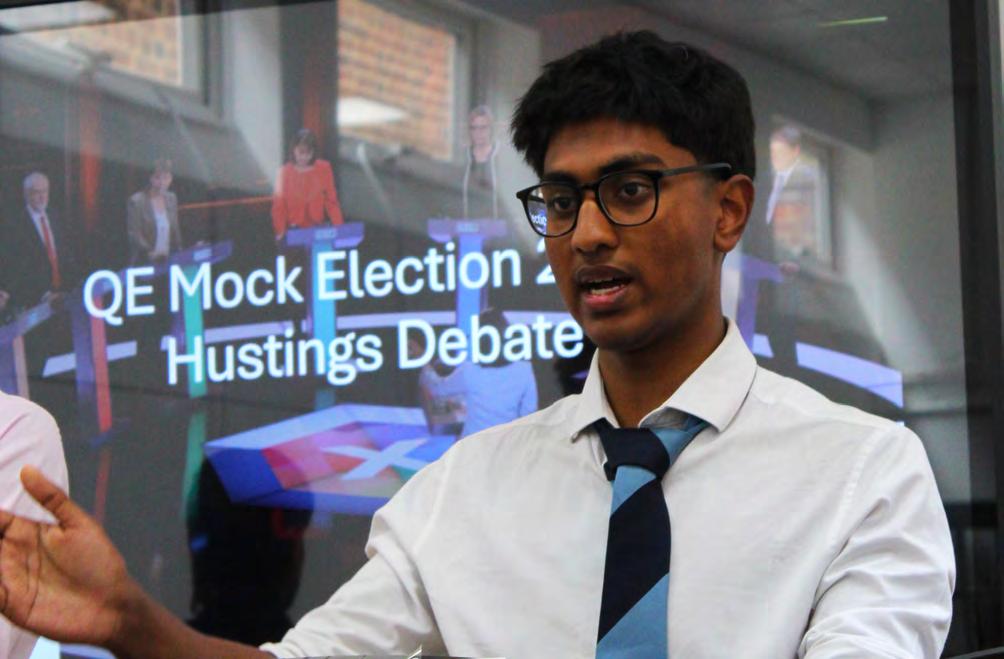
A-level:Years12–13(KeyStage5)
Pleasefollowthelink: AQAPoliticsA-level(7152)
Science
LowerSchoolScienceprovidesthefundamentalbuildingblockson whichanunderstandingofthesciencesatahigherlevelisachieved.
WeseektohelppupilsunderstandthatScienceisasubjectwhichisalways evolvingasnewideasandtheoriesaredevelopedandtested,andthatfacts cannotsimplybelearnedfromabook.Anenthusiasmandwiderinterestin thesciencesbeyondthetaughtcurriculumisencouragedthroughopportunities forindependentresearch.
PracticalworkisattheheartofScience:ourLowerSchoolSciencecurriculum deliberatelyplacestheemphasisonboysexploringthescientificworldthrough practicalinvestigation.Alliedwiththisaimisafocusontheacquisitionofscientific competence,sothatQEboysbecomeconfidentatayoungageintheapplication oftheorytoexplainobservationsfrompracticalwork.Thestudentsaretaughtby subjectspecialistsfromYear8.
IthinkPhysicsismyfavouritescience.It’sinterestingtolearn aboutthingswhereobjectsseemtoworksodifferently.Wehave testreviews,whichgetmarkedandgiventouswithfeedback forustoimprove.IfindithelpfultoknowwhatIhavetoimprove at,soIcanapplyadifferentmethodtoachieveabetteranswer. Iwouldliketogointoaerospaceengineeringasacareer,so certainlyplantocarryonstudyingPhysicsatA-leveland atuniversity,asitwillbekeytohowIwork.
RanvirSinha,2024leaver
LowerSchoolScience:Years7–8
ThelowerschoolcurriculumhereatQueenElizabeth’s isdesignedtodevelopthefollowingskills:
• Academicintegrity
• Assimilationofinformation
• Analysisandsynthesis
• Concentration
• Constructingandsupportingarguments (inwritingandorally)
• Criticalthinking
• Open-mindedness
• Planning
• Problemsolvingandcreativity
• Progressiveindependence
• Reflection
• Researchandreferencing
• Resilienceandresourcefulness
• Revision
Specifically,theSciencecurriculum willdevelop:
Practicalskills
• Planninganexperiment
• Devisinganappropriatemethod
• Carryingoutpracticalworksafely
• Recordingdataappropriately
• Presentationofresults
• Discussionofresults
Thinkingskills
• Analysisofdataandlinkingtotheory
• Applicationoftheorytosolvenovelproblems
Labskills–introductorypracticalcourse
Cells
Reproduction
Particlesandtheirbehaviour
Atoms,elements,compoundsandmixtures
Electricity&energy
Forcesandmotion Year7
BIOLOGY
Cellstosystems
Cellulartosystemsbiology
–Respiration
–Exerciseandmovement
Energyflowsfromorganellestoecosystems
–Photosynthesis
–Energyflowthroughanecosystem
CHEMISTRY
ThePeriodicTable
Chemicalreactionsandtrends
Acidsandalkalis
TheEarth,rocks,andgreenchemistry
PHYSICS
Heatingandcooling
Waves
Magnets
Earth,spaceandgravity
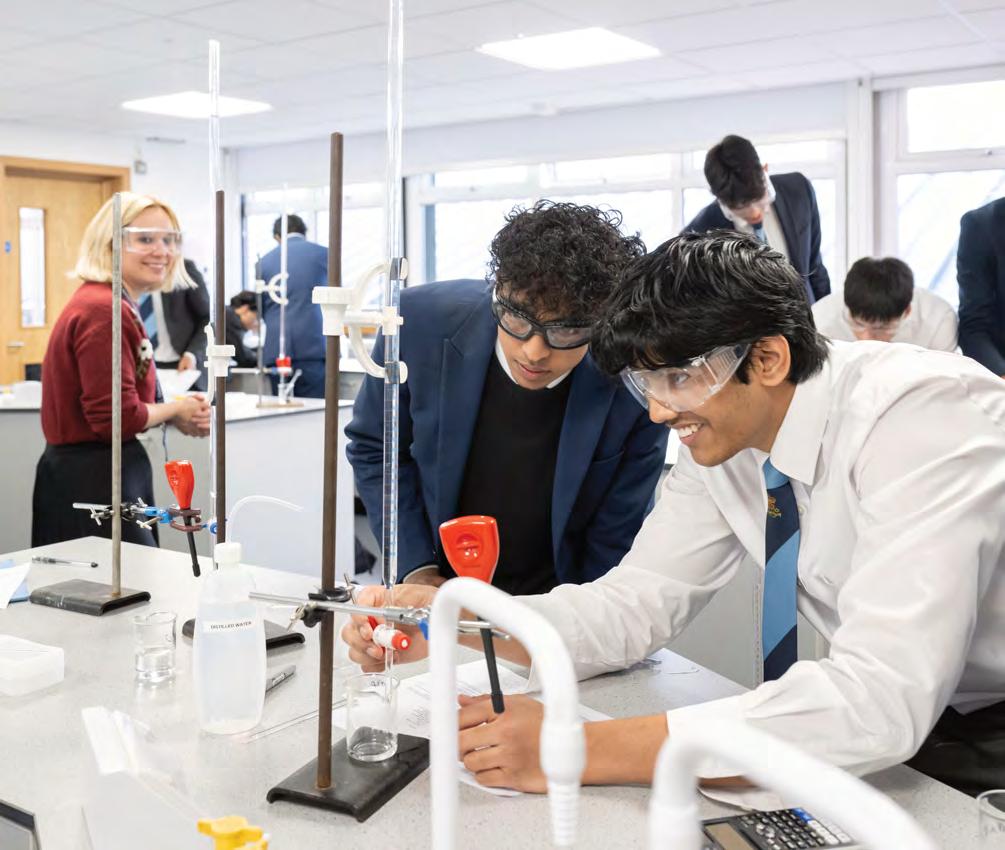
GCSE:Years9–11(GCSEteaching,encompassing Biology,ChemistryandPhysics,beginsinYear9)
Pleasefollowthelinks:
SeparateSciences
AQABiologyGCSE(8461)
AQAChemistryGCSE(8462)
AQAPhysicsGCSE(8463)
DoubleAward
AQAGCSECombinedScience:Trilogy(8464)
A-level:Years12–13(KeyStage5)
Pleasefollowthelinks:
AQABiologyASandA-level(7401&7402)
AQAChemistryASandA-level(7404&7405)
OCRPhysicsAS-level(H156)
OCRPhysicsA-level(H556)
Sociology
Sociologyisthestudyofsociety.Itexplorestheorigins,organisation andinstitutionsofsociety.Itasksbigquestions,suchas‘whyare wealthandstatusdistributedastheyare?’andseekstoanswer themusingrigorousmethodology.
Inanintellectualenvironmentthatisatoncedynamic,interactiveandsupportive, Sociologylessonsexplorewhatunitespeopleinsociety,aswellasthedivisionsand prejudicesthatsurroundus.Issuesofwealthandpoverty,crime,sexismandracism runthroughthecourse,whileareassuchaseducationandfamilies&households areexaminedindepth.
OfferedasaSixthFormsubjectatASandA-level,Sociologyistaughtinsmall groups;allpupilscontributetodiscussionanddebate,andopen-mindedness andtoleranceoftheviewsofothersareessential.
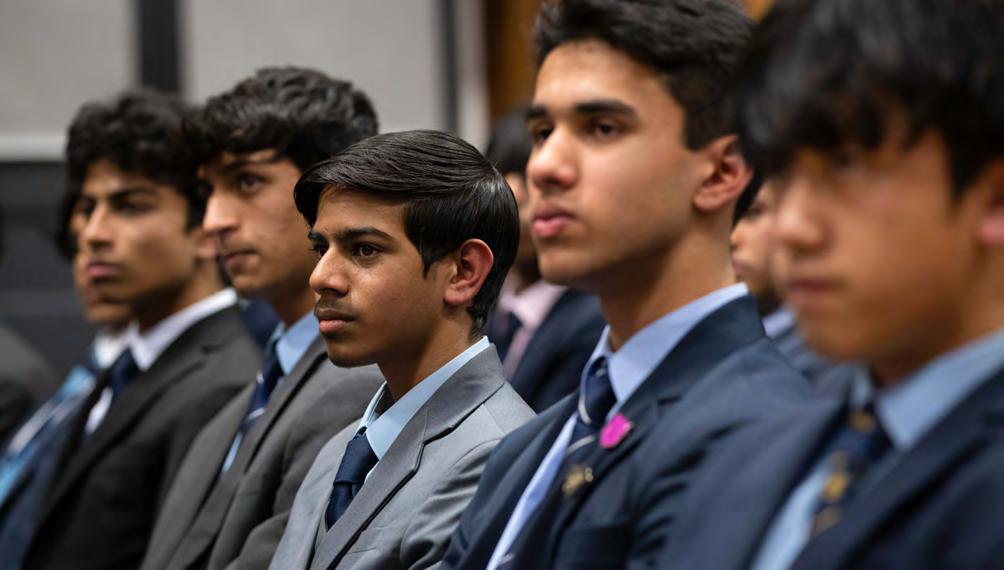
A-level:Years12–13(KeyStage5)
Pleasefollowthelink: AQASociologyASandA-level(7191&7192)
Technology
Technologyisaboutthefuture;itisaboutchangingtheworld aroundustowhatitmightbe,orshouldbe.Wetellourpupils: “Theonlylimithereisyourownimagination;wewillhelpyou discovertherest.”Sincetechnologyisever-changing,thereis greatscopeforintroducingideasthroughindependentresearch anddevelopmentbasedonone’sowninspirationandindividuality. Thedepartmentstrivestoempowertheboysbyhelpingthemdevelop theskillsandconfidenceneededtobeattheforefrontofthischange.
Ourprojectsassistthatdevelopmentinanumberofways,fromusingcutting edge-technologytocreateground-breakingprototypes,toreinforcingthe principlesofotherSTEM(Science,Technology,Engineering,Mathematics) subjectsinacreativeenvironment.Projectsacrossallyeargroupsaretaught withacombinationofboththeoryandpracticalwork.
Wehopetonurturetheleadersoftechnologicaladvancementinthe future,developingtheskillsetsandframeworksofanalysisthatourboys willneed.Pupilsbeginbygainingabasic,conceptualgraspoftechnological systemsandtheories;theyprogresstoaverydetailedandpracticallyuseful understandingoftheapplicationsofthosetheories.Wealwayslookatthe taskathandfromtheperspectiveofaprofessionalengineer,designer, scientistorresearcher.Boysareplacedintorealisticsituationsencountered byaprofessional,whetherthatbemeetingdeadlines,presentingone’s ideas,discussingsolutionswithone’speersorevaluatingprogress. Muhammadstoodoutwithhisdecentralisedcommunicationsystem, whichavoidsrelianceoncellularorsatellitenetworksandhasgreat opportunitiesforsearchandrescue,leisureandotherbusinessuses. [He]demonstratedindependentlearningandgreatcommunication andpresentationskillsandisaworthywinneroftheprize!
MarkWood,SocialSustainabilityLeadatcompetitionsponsorSiemensGB&I,explainswhy2025 QEleaverMuhammadShahwonthetitleofTheBigBangUKYoungTechnologistoftheYear2025.
LowerSchoolTechnology:Years7–9(KeyStage3)
ThelowerschoolcurriculumhereatQueenElizabeth’s isdesignedtodevelopthefollowingskills:
• Academicintegrity
• Assimilationofinformation
• Analysisandsynthesis
• Concentration
• Constructingandsupportingarguments (inwritingandorally)
• Criticalthinking
• Open-mindedness
• Planning
• Problem-solvingandcreativity
• Progressiveindependence
• Reflection
• Researchandreferencing
• Resilienceandresourcefulness
• Revision
Specifically,theTechnologycurriculum willdevelop:
TechnologicalSkills
• Knowledgeofsafeandhealthypractice (FoodTechnology/MakeIt)
• Researchsynthesisskills(various)
• Primaryresearchskills,clientempathy(Fixperts)
• Communicationskills(all)
• Productanalysis(various)
• Open-mindednessandinvestigatoryskills (AnalyseIt/Electronicgame)
• Holisticapproachtoprojectwork (Electronicgame/LightTouch)
• Sketching/drawingskills(various)
• Kinaestheticskillsofmanufacturingadesign outcome(various)
• CAMprocessesandrequirementsfortransfer fromCAD(Electronicgame/F1Engineering)
• ProgramminginCandGraphicalC(LightTouch)
• Evaluationofanexperience(FoodTechnology)
TechnologicalConcepts
• Iterativedesign-Research,Design,Evaluate, Improve(various)
• Specificationsasrulesbasedonprior research(various)
• CFD(ComputationalFlowDynamicsSimulation -F1Engineering)
TechnologicalKnowledge
• Tools&machines(Various)
• ACCESSFMM/CAFEQUESFrameworksofanalysis (various)
• Knowledgeofcookeryprocesses(FoodTechnology)
• FoodScience;dietaryrequirementsandnutrition (Year9FoodTechnology)
• Foodsafetyandfoodpoisoning(FoodTechnology)
• Drawingstandardsandmeasurementstandards (DrawIt)
• AerodynamicsandBernoulli’sPrinciple(F1Engineering)
• Current,Voltage,Resistance(Electronicgame)
• 6RsofSustainability(LightTouch)
• Moral,SocialandEthicalImplicationsofDesign (Year9FoodTechnology)
• Projectionsystems(DrawIt)
• Materialsknowledge-propertiesofresistant materials(LightTouch)
LowerSchoolTechnology:Years7–9(KeyStage3)
Year7
DrawIt
DesignIt
MakeIt
TestIt
FoodTechnology(Theory)
FoodTechnology(Practical)
Year8
Electronicgameproject
F1Engineering
FoodTechnology(Theory)
FoodTechnology(Practical)
Year9
FixpertsDesignTheory
LightTouch
FoodTechnology(Theory)
FoodTechnology(Practical)
MakerSkills
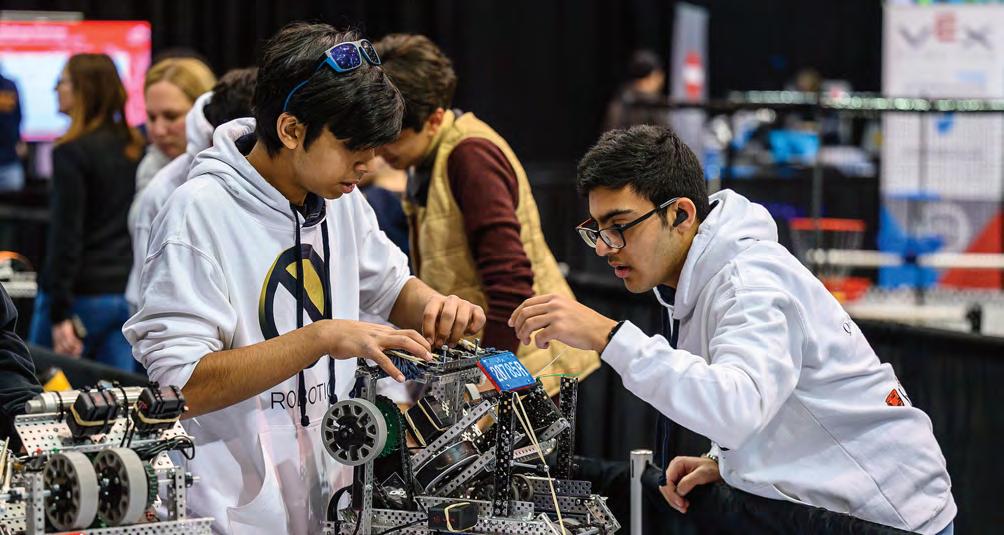
GCSE:Years10–11(KeyStage4)
Pleasefollowthelink: AQADesignandTechnologyGCSE(8552)
A-level:Years12–13(KeyStage5)
Pleasefollowthelinks: AQADesignandTechnology:ProductDesignA-level(7552)
Year7DigitalLiteracy
DigitalLiteracyaimstoupskillourlearnersinpreparationfor QE’sblendedapproachtoteachingandlearning,aswellasensuring theyaredevelopingtherelevantdigitalskillstomakethemreadyfor careersinthe21stcentury.Whilstthereisageneralacceptancethat someofourstudentshaveanexceptionallevelofdigitalliteracy, thiscourseaimstocaterforthoselearnerswhomaynothavesuch extensiveexperience,andtobringalltoauniformlevelofcompetency bytheendofYear7.
ThelowerschoolcurriculumhereatQueenElizabeth’s isdesignedtodevelopthefollowingskills:
• Academicintegrity
• Assimilationofinformation
• Analysisandsynthesis
• Concentration
• Constructingandsupportingarguments
• Criticalthinking
• Open-mindedness
• Planning
• Problemsolvingandcreativity
• Progressiveindependence
• Reflection
• Researchandreferencing
• Resilienceandresourcefulness
Specifically,theDigitalLiteracycurriculumwilldevelop thefollowingskills,aswellascoveringtheconceptsset outbelow:
DigitalSkills
• Programminginvariouslanguages
• Digitalresearch;presentationofinformationusing variedforms
• Design,useandevaluationofcomputational abstractionsthatmodelthestateandbehaviour ofreal-worldproblems
• Useoflogicalreasoningtocomparetheutility ofalternativealgorithmsforthesameproblem
DigitalConcepts
• EssentialknowledgeofE-Safetyandhowtostay safeonline
• Understandingofseveralkeyalgorithmsthatreflect computationalthinking;forexample,onesforsorting andsearching
• UnderstandingofsimpleBooleanlogicandsomeof itsusesincircuitsandprogramming
• Understandingofthehardwareandsoftware componentsthatmakeupandcommunicatewithin computersystems
• Understandingofhowinstructionsarestored andexecutedwithinacomputersystem
PersonalDevelopmentTime
AtQueenElizabeth’sSchool,whileweareproudofouracademic achievements,wealsowantallourpupilstobebothhappyand resilient.Wethereforehavecarefullystructuredpastoralsupport andguidancetonurturegoodmentalhealthamongourboys. OurPersonalDevelopmentTimeprogrammeisattheheart ofthispastoralsupport,whilealsoofferingguidanceinareas suchascareersadvice.
InlinewiththeSchool’smissiontoproduceyoungmenwhoare‘confident, ableandresponsible’,theextensivePDTprogrammeaimstofosterand maintaingoodmentalhealthbygivingpupilsa‘toolbox’ofstrategies theycanusetomanagetheirownexpectationsanddisappointments. Allboysreceive90minutesofPDTeachweek.
PDTconsistsoffourelements:
• PDTTaughtSessions:tutorsdeliverlessonsspecificallydesigned aroundtheaimsoftheprogramme.
• Assemblies:theseareledbyHeadsofYearandreinforcemessages fromthetaughtsessions.
• PDTDiscussionSlots:thesefocusonspokencommunication, withclassdiscussionconsideringtopicalissues.
• BespokeTutorials:one-on-onediscussionsbetweentutorsandboys, whichtakeplaceonatermlybasis.
PDTaimstodevelopinboysaknowledgeandunderstandingofdiverse cultures,fromaroundtheworldandthosewithinourownpluralisticsociety, andoftheinstitutions,servicesandtraditionsofBritain.Weseektofoster anattitudeoftoleranceandrespecttowardsthosefromacultureor backgrounddifferenttoone’sown.Inaddition,weseektosupport boysinexploringandunderstandingtheirpersonalfeelings,attitudes andvaluesandthoseofothers,andtoaddressmoralandsocialquestions relevanttoforminghealthy,enjoyableandfulfillingrelationships.
OurPDTcurriculum
Transition Safety&Respect LivingOnline WiderWorldAwareness* ExploringDreamJobs &UniversityAspirations**
Health MediaLiteracy Confident&Responsible Masculinity* ExploringStudyingin America,Apprenticeships &T-Levels
Year10
Relationships &SexEducation OnlineRelationships Careers&Work ExperiencePreparation BritishValues*
DealingwithChallenge DecisionMaking AlternativeCareers* ExploringMasculinity* CareersConvention**
HealthyBody&Mind Careers SecurityOnline ActivismAwareness* Post-16Options**
AdaptingtoChangeand BritishValues Equality&Respect ApproachingExams &University BigQuestions* SuperCurricularideas* DegreeApprenticeships** UniversityApplications** EnteringAdulthood FirstAid ReligionandEthics Travel&PersonalSafety GapYearOpportunities**

02084414646 admissions@qebarnet.co.uk
